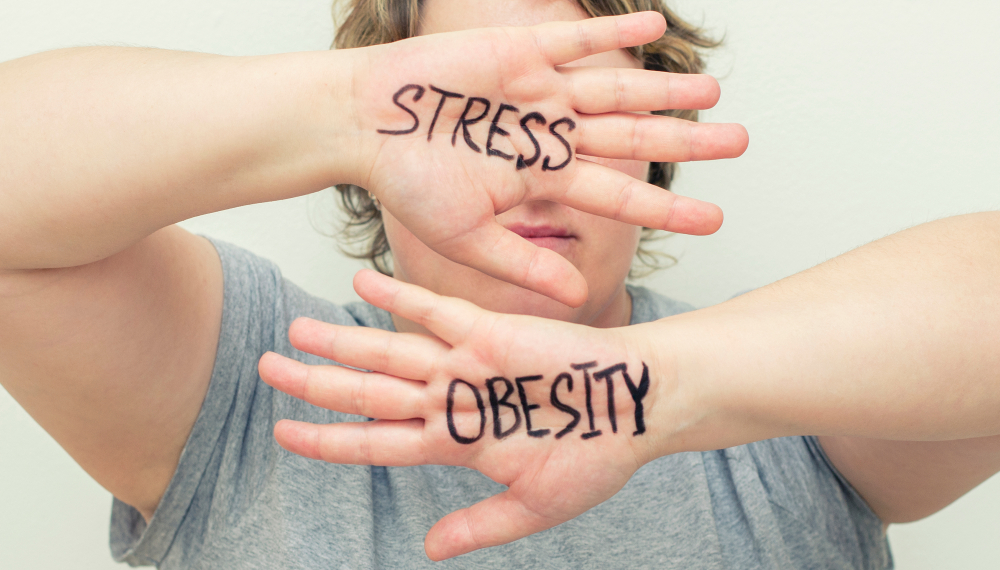Is Stress Causing Weight Gain?


It has long been known that stress and weight gain can be linked. Now new evidence is suggesting it’s better to get stressed in the daytime (as opposed to in the evening), if we want to stay slim. (5)
A study by Stanford University School of Medicine is providing the first molecular understanding as to why people may gain weight due to chronic stress, disrupted sleep cycles, or by taking certain medications known as glucocorticoids. It’s all in the timing of the dips and rises of glucocorticoids, a specific class of hormones. (1,5)
Our bodies produce their own glucocorticoids. These steroid hormones perform a variety of functions, including regulating how our cells use sugar and fat, and also reduce inflammation. (5,9)
Glucocorticoids can also be manufactured by pharmaceutical companies, as powerful medicines that fight inflammation and work with our immune systems to treat a wide range of health problems. (5,9)
Treatments with pharmaceutical glucocorticoid drugs, which are often essential for people with rheumatoid arthritis and asthma to function throughout the day, are linked with obesity. Thus, scientists are always looking for ways that such treatments can be given safely without the common side effects of weight gain and bone loss. (5,9)
Hunger Pangs
Several hours after eating a meal our blood sugar levels drop. Neurons in our hypothalamus (a brain region that is responsible for controlling feeding) detect this change and activate a pertinent pattern, making the brain alter our body state so that we feel hungry.
We then eat, and the ingestion of food ends our hunger. Finally, the hypothalamus again detects a change in our blood sugar. This time an increase in blood sugar and the appropriate neurons bring our body to a state of satiety.
The goal of this process was to save our bodies. The body is no longer in danger from starvation; saved, sensed, and managed by our brain. (1,2,3)
Yet with statistics showing more than 1 in 3 adults are considered to be overweight, it is clear many of us seem to be feeling in danger often – or nowadays, in other words – stressed. (4)
Stress And Weight Gain
Precursor, or progenitor cells, which are the intermediate state between an undifferentiated stem cell and a fully differentiated one, transform into fat cells in the human body, causing weight gain. (7)
A healthy person converts no more than 1% of their precursor cells to fat cells, and this occurs when glucocorticoids are released. (7)
A person’s glucocorticoid levels naturally rise and fall throughout the day, a cycle regulated by our circadian rhythms – a complex network of circadian pacemakers that influence our metabolic processes in our human sleep/wake and feeding/fasting cycles. This cycle repeats roughly every 24 hours, responding primarily to light and dark, and it affects most living things. (6,7,8)
The level of glucocorticoids in a healthy person peaks around 8 a.m., dropping to its lowest around 3 a.m. the next day, and then rises back to its peak about five hours later. The rise is a wake-up call that gets us up and moving and whets our appetites. Stress also raises glucocorticoid levels in our bloodstream; short-term stress, such as exercise, causes spikes, while chronic stress causes sustained levels. (6,8)
Whenever the natural circadian rhythm is altered by external factors, this has psychological (cognitive function and mental health) consequences, as well as physiological (metabolic stress). (6,8)
Body Clocks Matter
These findings propose new ways to minimize weight gain, by managing the timing of hormonal pulses. Mary Teruel, Ph.D, assistant professor of chemical and systems biology and senior author of the study, was always puzzled by an otherwise natural, and well-known process through which our body produces fat cells. (1,5)
Teutal asked herself: ‘Why aren’t we drowning in fat every time glucocorticoid levels go high in the morning due to normal circadian rhythms or when our glucocorticoid levels spike when we exercise or go from a warm building out into the cold? And why is losing the normal rhythm of glucocorticoid secretion — such as in conditions of chronic stress, jet lag, and sleep disruption in shift-workers — so linked to obesity?” (1,5)
To solve the mystery, they used single-cell live imaging to track the activity of a protein that is known to correlate with the differentiation and maturity of a fat cell: PPAR-gamma (PPARG). They found that one pulse of glucocorticoids lasting 48 hours led most of the cells to differentiate, while shorter pulses with at least 12 hours between them resulted in minimal differentiation. Next, in a 21-day study in mice, the researchers found that loss of the normal circadian rhythm for glucocorticoids led to a doubling of the animals’ fat mass. (7)
They also found no increase in fat occurred as long as they boosted glucocorticoids, delivered by injection, only during the normal circadian peak times. (1,5)
Circadian Code, Stress, And Hormones
The results suggest that even if we get significantly stressed with glucocorticoids, we won’t gain weight, as long as stress or the glucocorticoid medication intake happens only during the day. But if we experience chronic, continuous stress, or take these medications at night, the resulting loss of normal circadian glucocorticoid oscillations will result in significant weight gain. (1,5)
Knowing which hormones can cause weight gain is helpful:
Cortisol Too much cortisol circulating in the bloodstream for a long time increases the activity of neurons in the hypothalamus that signal “I am hungry.”
Leptin normally signals “stop eating, I am full.” When there is a lot of cortisol around for a long time, leptin is less able to send this signal and so this “I am full” message is no longer as strong.
Ghrelin, the ‘hunger hormone’ promotes appetite, and is increased in the bloodstream when we are stressed. (3)
It’s important to have our hormones checked if we feel our stress and weight gain are linked.
We should also maintain positive social relationships with family and friends, develop self-reliance and optimism, engage in demanding activities like sports or exercise, and make healthy food choices. (3)
Lastly, we should also consider our hormonal health. Anything which appears to be a random bodily reaction, rarely ever is. Balance your hormones, balance your weight, balance your life. Click here to learn more.
- https://www.sciencedaily.com/releases/2021/04/210412114802.htm
- https://www.ncbi.nlm.nih.gov/pmc/articles/PMC3090647/
- https://kids.frontiersin.org/articles/10.3389/frym.2019.00095
- https://www.niddk.nih.gov/health-information/health-statistics/overweight-obesity
- https://med.stanford.edu/news/all-news/2018/04/timing-of-stress-hormone-pulses-controls-weight-gain.html
- https://res.mdpi.com/d_attachment/biomolecules/biomolecules-11-00516/article_deploy/biomolecules-11-00516-v3.pdf
- https://www.medicalnewstoday.com/articles/321407#How-do-glucocorticoids-affect-fat-cells
- https://www.nigms.nih.gov/education/fact-sheets/Pages/circadian-rhythms.aspx
- https://www.webmd.com/multiple-sclerosis/what-are-glucocorticoids









